Humans
Sign up for our newsletter
We summarize the week's scientific breakthroughs every Thursday.
-
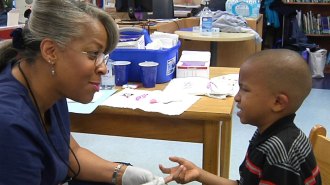 Health & Medicine
Health & MedicineNearly half a million U.S. children missed out on lead tests in early 2020
A big drop in routine lead tests, which can identify children with elevated blood levels, is another troubling sign of the pandemic’s toll.
-
 Archaeology
ArchaeologyAn ancient Egyptian mummy was wrapped in an unusual mud shell
Commoners in ancient Egypt may have used mud in place of expensive resin to imitate royal mummification techniques.
-
 Health & Medicine
Health & MedicineCOVID-19 precautions may be reducing cases of flu and other respiratory infections
The same efforts to prevent COVID-19’s spread can keep other respiratory infections at bay. But once we go back to normal, outbreaks could be larger.
-
 Health & Medicine
Health & MedicineDiabetes during pregnancy is tied to heart trouble later in life
Gestational diabetes may increase a woman’s risk of having hardened arteries later in life, a long-term study finds.
-
 Health & Medicine
Health & MedicineThe antidepressant fluvoxamine could keep mild COVID-19 from worsening
Newly infected patients who chose to take fluvoxamine quickly recovered, while 12.5 percent who didn’t wound up hospitalized.
-
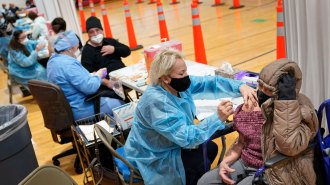 Health & Medicine
Health & MedicineWhat do COVID-19 vaccines mean for daily life in the months ahead?
Effective COVID-19 vaccines are a ray of hope. But masks and distancing are still necessary, especially with contagious variants spreading.
-
 Health & Medicine
Health & MedicineOne-shot COVID-19 vaccine is effective against severe disease
The effectiveness of Johnson & Johnson’s vaccine at preventing hospitalization and death holds up against a South Africa variant of the coronavirus.
-
 Health & Medicine
Health & MedicineNovavax’s COVID-19 vaccine is effective, but less so with some variants
Novavax’s vaccine fends off the original coronavirus and a U.K. variant, but had more trouble with a South Africa variant.
-
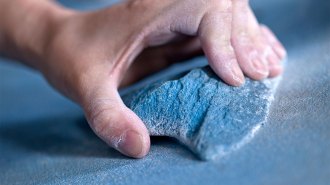 Anthropology
AnthropologyHumanlike thumb dexterity may date back as far as 2 million years ago
A computer analysis suggests early Homo species developed a powerful grip, giving them an evolutionary edge over some other tool-using hominids.
By Bruce Bower -
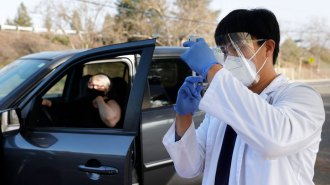 Health & Medicine
Health & MedicineHow coronavirus variants may pose challenges for COVID-19 vaccines
Some coronavirus mutations may make vaccines less effective, but the immune system is multifaceted and vaccines can be updated.
-
 Psychology
PsychologyThe COVID-19 pandemic made U.S. college students’ mental health even worse
College students struggled with mental health problems before the pandemic. Now, some vulnerable students are even more at risk.
By Sujata Gupta -
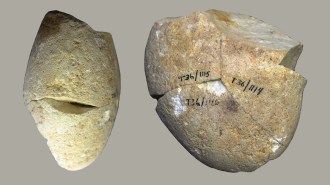 Archaeology
ArchaeologyThe oldest known abrading tool was used around 350,000 years ago
A flat-ended rock found in an Israeli cave marks an early technological shift by human ancestors to make stone tools for grinding rather than cutting.
By Bruce Bower